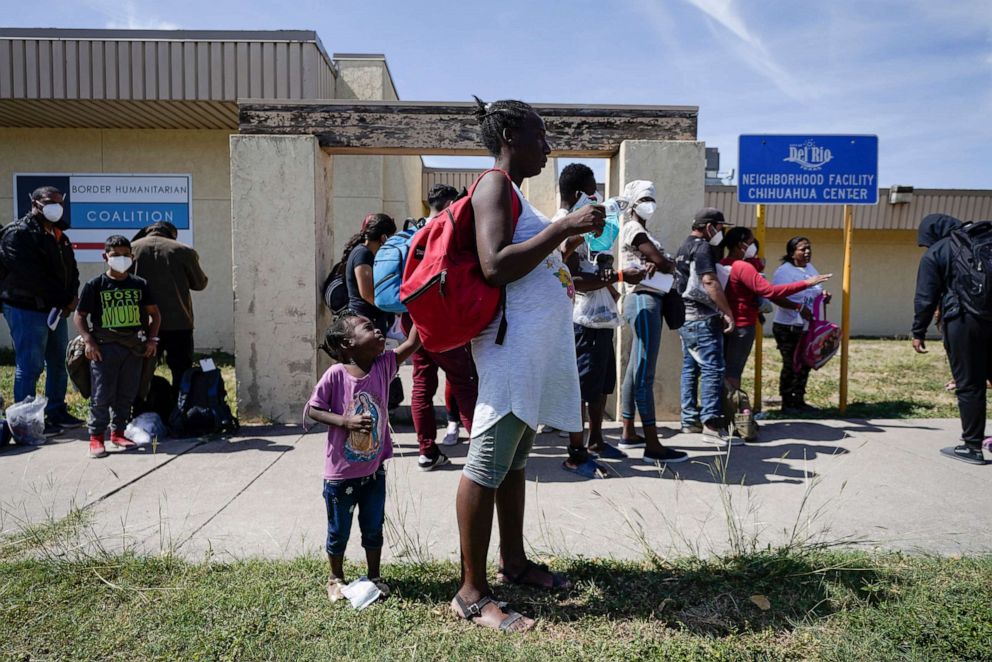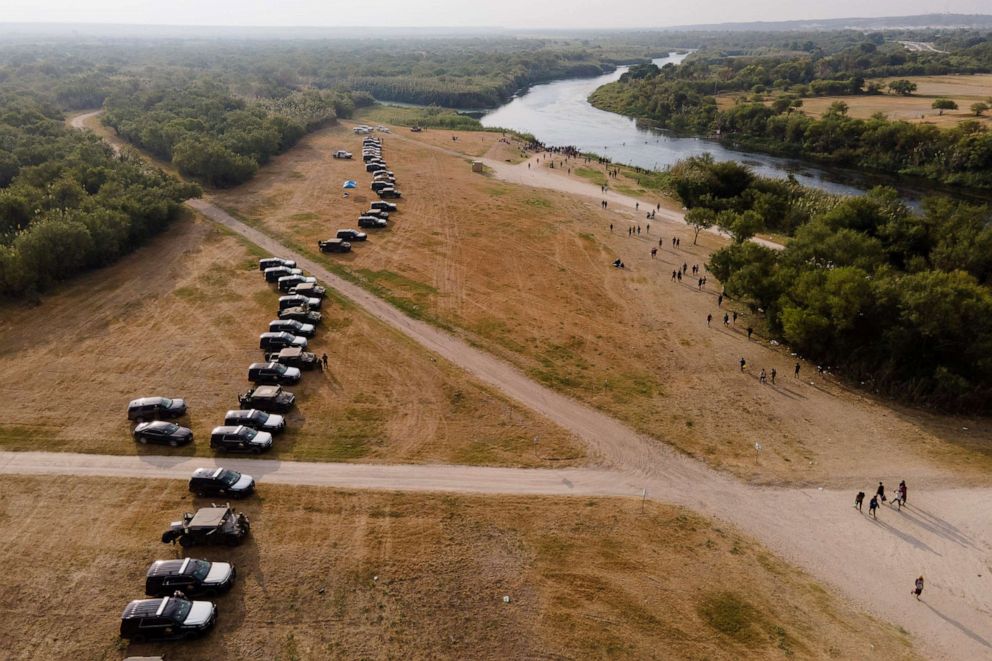Democrats lash out at Biden administration over handling of Haitian migrants
Images of Border Patrol agents on horseback have stirred outrage.
Even as the Biden administration makes progress toward dispersing the large group of mostly Haitian nationals gathered in Del Rio, Texas, government officials are facing internal divisions over how the migrants have been treated.
"As we speak out against the cruel, the inhumane, and the flat out racist treatment of our Haitian brothers and sisters at the southern border we cannot and we must not look away in this moment," Democratic Rep. Ayanna Pressley said Wednesday.
Joined by a growing chorus of Democratic leaders in Congress, Pressley was referring to the striking images of Border Patrol agents on horseback confronting migrants and snapping their reins aggressively.

Some Democrats are also calling on the Biden administration to immediately stop repatriating the Haitians back to their island nation, citing concerns about safety. As of Wednesday night, officials reported there were fewer than 5,000 migrants left in the encampment under an international bridge in the South Texas town of Del Rio, as the Biden administration scrambles to track, process and remove the group that at one point ballooned to more than 14,000 people.
"Despite the Administration’s rapid deployment of personnel and resources in response to this crisis, much of the strategy to address the care of these vulnerable individuals is deeply concerning," Democratic Reps. Bennie Thompson and Gregory W. Meeks said in a joint statement on Wednesday. "Specifically, we urge the Administration to halt repatriations to Haiti until the country recovers from these devastating crises."
The Department of Homeland Security has a limited number of options after agents encounter unauthorized migrants in the border region. Some are referred to ICE custody for detention or deportation while many are released to U.S. resettlement organizations and given a future date to report or appear in court.

DHS extended temporary protections for Haitian nationals over the summer. But it only moved the deadline to apply to July 29. That means those who have arrived more recently do not qualify for the Temporary Protected Status designation even if they fled Haiti before the deadline, and thay are subject to removal under what's called Title 42.
"We have looked at the country conditions and made a determination that in fact we can return individuals who've arrived," Department of Homeland Security Secretary Alejandro Mayorkas said.
DHS provided a statement to ABC News Wednesday evening saying removal flights from Texas to Haiti will continue, noting that more than 1,400 migrants have already been flown back. More than 3,200 have been transferred elsewhere for processing, removal proceedings or expulsion, the Department said.
Since the beginning of the pandemic, the government has rapidly expelled hundreds of thousands of migrants from the U.S. under a decades-old part of the public health code known as Title 42. These expulsions have gravely concerned immigrant advocates who say the process cuts off access to the humanitarian protections some migrants are due.
Immigration officials have cited the protocols as a necessary tool in managing the migration challenges, but resources on the border have remained strained and agents have been pushed to their limits in an attempt to manage the influx in Del Rio.

At the same time, images of the tactics used by Border Patrol agents on horseback have stirred outrage from Democrats, with some drawing connections to extremist views.
"Congress must do the work of investigating and ensuring accountability of the egregious and white supremacist behavior of border patrol agents in Del Rio Texas," Pressley said at the Wednesday press conference.
Mayorkas addressed the images of the horse mounted patrol at the beginning of Wednesday’s House Homeland Security Committee hearing and reiterated that the agents in question won't be interacting with migrants while the agency investigates.
"The facts will drive the actions that we take," Mayorkas said. "We ourselves will pull no punches, and we need to conduct this investigation thoroughly, but very quickly."
He said he expects the investigation to wrap up "in days and not weeks."
Mayorkas was pressed again Wednesday about providing data that explains what has happened to migrants after they've been arrested or detained by border officials. When asked repeatedly by Republican Rep. Carlos Gimenez of Florida, he declined to provide specifics or estimations, citing concerns over accuracy.
"Congressman, I want to be precise in my communication of data to the United States Congress and to you specifically having posed the question," Mayorkas said.
White House Press Secretary Jenn Psaki was also questioned Wednesday on the lack of information coming out of DHS about where the Haitian nationals are ending up, including how many have been released into the U.S.
"I certainly understand why you're asking and understand why people have been asking Secretary Mayorkas," Psaki said. "Those are numbers that are -- the secretary -- the Department of Homeland Security would have the most up-to-date numbers."
"But why is it so hard to keep track of a simple number like that?" asked ABC News White House Correspondent Cecilia Vega. "Why can't you give it? Why can't he give it? It’s been two days now he's been asked that."
"I'm certain they will provide it. It's an absolutely fair question to ask, and I'm certain he just wanted to have the most up-to-date numbers to provide," Psaki responded.

Vice President Kamala Harris spoke to Mayorkas on Tuesday, expressing her concerns about the treatment of migrants at the hands of agents for Border Patrol, a subdivision of the Department of Homeland Security.
Mayorkas promised her an update on the investigation into the incident involving Border Patrol agents on horseback and said the department is taking its obligations to provide humanitarian support seriously, according to a readout of the conversation from the vice president's office.
ABC News’ Kenneth Moton, Luke Barr, Sarah Kolinovsky contributed to this report.




